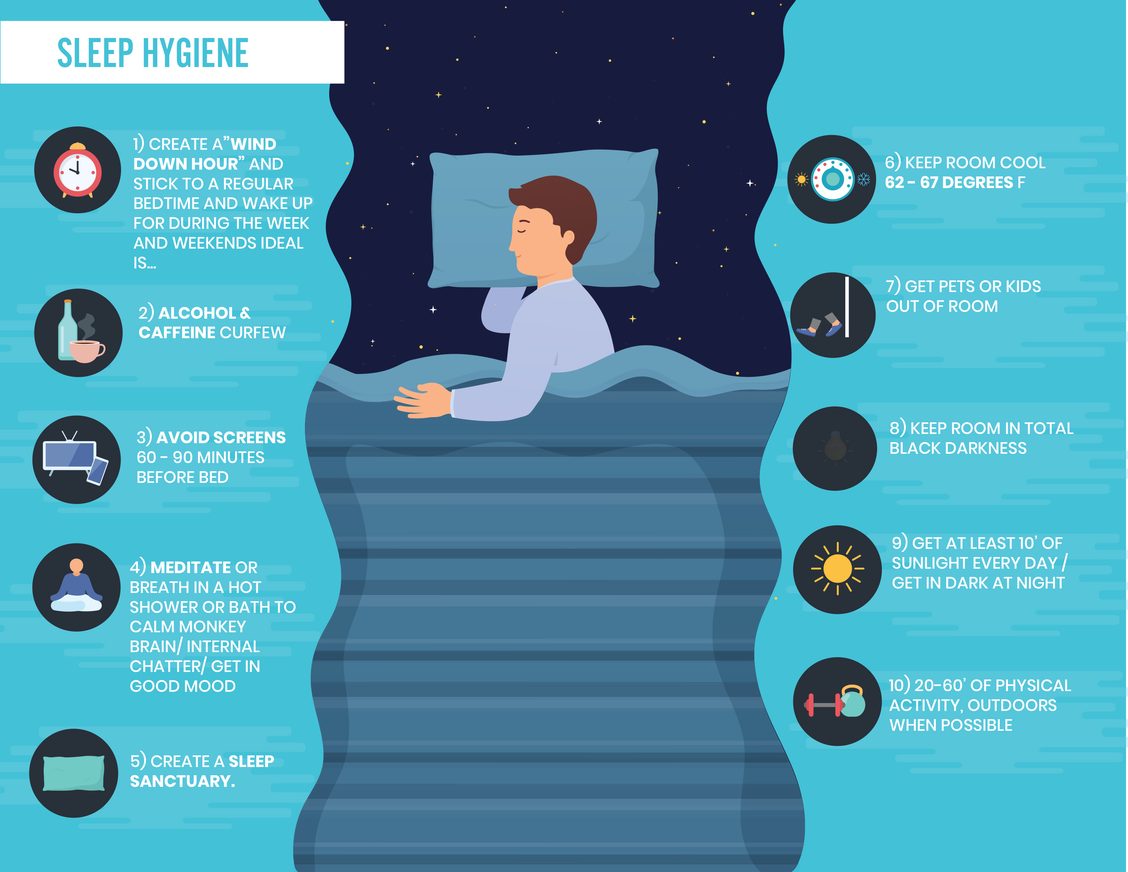
Happy Fall! It’s holiday pre-season, and all the festivities and cheer of the season are right around the corner. Like any pre-season, the rule of P’s applies - preparation prevents poor performance. It’s time to commit to building better habits now with the intention of continuing even after the "chaos" begins. We are also a little over a month away from daylight savings, in which the sun sets earlier and the cool breeze comes in - maybe even rain if we are lucky! Adjusting to the time by one hour doesn't seem like a big change, but it can be disruptive in our body's circadian rhythm. For example, if you are going to bed earlier than usual, you may experience difficulty falling asleep and increased wakefulness during the early hours of the morning.
Before we start to experience the stresses of the colder months, it is crucial that we take care of ourselves by prioritizing our sleep hygiene to ensure that we are well rested. Sleep hygiene describes actions that may enhance sleep quality by making small changes to your night time routine. This could include reducing or eliminating certain foods and beverages like caffeine or alcohol prior to bedtime, adjusting the temperatures in the room, exercising regularly earlier in the day, and creating calming rituals to help prepare your body for restful sleep. This month's tips for creating a better routine to improve your sleep quality include:
Fuel: Caffeine Curfew
When looking to improve the quantity and/or quality of sleep, one of the most obvious sources of fuel to avoid prior to bedtime is caffeinated beverages. According to the U.S. Sleep Foundation, caffeine should stop being consumed at least six hours prior to bedtime, and even more for those who are used to drinking caffeinated beverages throughout the day. The level of caffeine in your bloodstream peaks about one hour post consumption and stays at this level for several hours following. For most, this elevation can take up to 10 hours to metabolize from the bloodstream which is why the timing of consumption is critical. If you don't set a curfew for your consumption of caffeine you risk interrupting your sleep, which in turn interferes with daytime performance. As insufficient sleep takes its toll on energy and performance, the ‘need’ for caffeine to ‘make it through the day’ increases perpetuating the cycle of sleep deprivation and caffeine dependency. Chronic insufficient sleep leads to feeling fatigued and having problems with cognitive function such as learning, memory, problem solving, and emotion regulation. Controlling variables and creating consistent pre-bedtime routines and rituals not only aids in recovery but also performance in school, work, and the gym.
Other items to avoid consuming close to bedtime can include but are not limited to are: alcohol, heavy foods that are over-filling, foods with high water content, as well as foods high in sugar, spice, and acidity.
For more information visit:
https://www.sleepfoundation.org/nutrition/caffeine-and-sleep
https://www.sleepfoundation.org/nutrition/alcohol-and-sleep
Focus: The Environment
When considering your sleep regimen and how you can make adjustments for optimal sleep, here are a few things to keep in mind: how are you feeling physiologically and psychologically, and what is the most relaxing environment that you can create for quality sleep? It’s important to decrease brain stimulus as much as possible, which will send your body a physical cue to move towards a calm state. Some examples or ideas for things to experiment with as you aim to develop your sleep quality enhancing routine:
Other ways to improve and prepare for a better night sleep include keeping your routine consistent, budgeting a 30-minute window for winding down, unplugging from electronics, practicing meditation and mindfulness, and paced breathing.
For more information on sleep hygiene, visit: https://www.sleepfoundation.org/sleep-hygiene
Function: Timing of Exercise
Research from John Hopkins Center for Sleep has shown that the timing of exercise as well as consistent exercising habits can aid in falling asleep more quickly and improving quality. According to previous research, moderate aerobic exercise increases the amount of slow wave sleep, which is our state of deep sleep during which the brain and body have a chance to rejuvenate. Regular exercise can help stabilize your mood and decompress the mind and body, which can help to naturally transition from wakefulness to deep slumber. Timing of exercise is crucial to ensure we are ready to rest. If you tend to exercise closer to the end of your day, budget additional time to wind down. Since aerobic exercise causes the body to release endorphins that can lead to an increase in brain activity, a 1-2 hour gap prior to bedtime should be allotted in order for the brain and body to calm down. Elevation in body temperature from strength training and other exercises can also signal the body to become more active and alert, so if you are prone to exercising later in the day, give yourself 30-90 minutes to recover prior to preparing for sleep.
For more information visit: https://www.hopkinsmedicine.org/health/wellness-and-prevention/exercising-for-better-sleep
Putting it into Practice:
There are a number of wearables that track sleep quantity and quality. These can be useful tools in learning how different variables affect you individually as you seek to optimize sleep. It is important to correlate how you feel with the data you acquire. This process involves regular self assessment:
Do you wake up feeling rested and ready to start your day?
Were you awakened during the night? How quickly were you able to fall back to sleep?
Do you feel alert and energetic throughout the day?
Are you recovering from workouts and able to perform as expected?